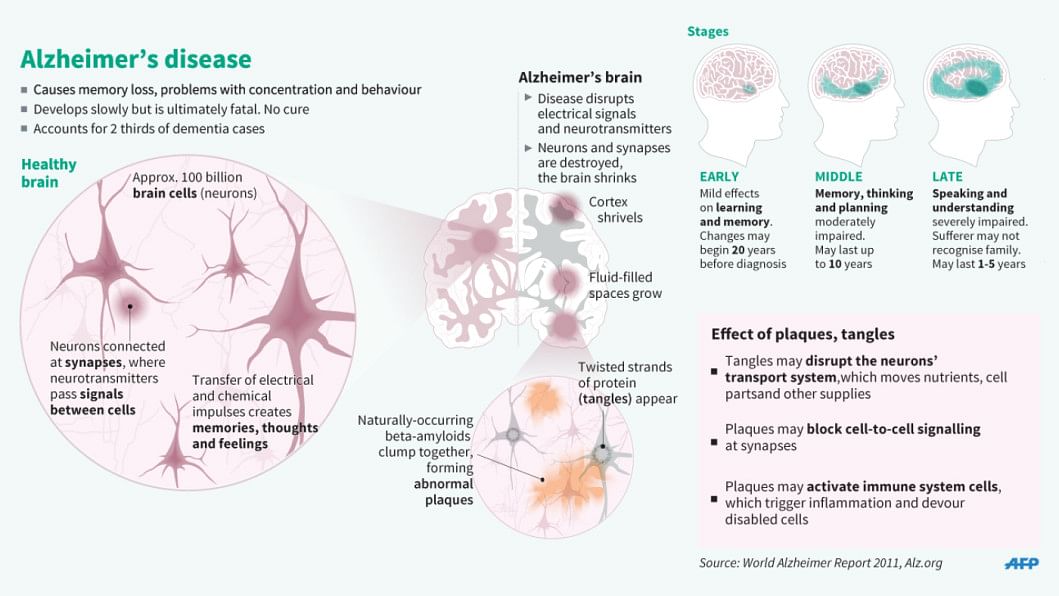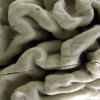World Alzheimer’s Day: Let’s not forget the forgetful

Maruf Ahmed (name changed for privacy), 64, used to forget his keys, phone, or his shopping bags when he was working as a government official. After his retirement, he suffered a mild stroke, and since then his forgetfulness increased dramatically. Now he cannot even remember if he has taken his food! He is suffering from dementia, which could be due to Alzheimer's disease.
Like Maruf Ahmed, there are approximately 460,000 people suffering from dementia in our country, according to Alzheimer's Disease International Asia Pacific Report-2015, which would be doubled in 2030 and tripled by 2050.
Today, on the World Alzheimer's Day, let's have an overview of the disease and its current state in our country.
What is Alzheimer's?
Alzheimer's disease is the most common cause of dementia, a general term for memory loss and other cognitive abilities that interfere with daily life. About 60 to 80 percent of dementia cases are because of Alzheimer's.

Primary Symptoms of Alzheimer's
Alzheimer's gradually progresses over the years, but there are some primary symptoms of the disease. According to Mayo Clinic, these symptoms are more persistent than occasional memory lapse and worsen over time in Alzheimer's patients.
The symptoms are:
- Repeat statements and questions over and over, not realising that they've asked the question before.
- Forget conversations, appointments or events, and not able to remember them later.
- Routinely misplace possessions, often putting them in illogical locations.
- Get lost in familiar places.
- Eventually forget the names of family members and everyday objects.
- Have trouble finding the right words to identify objects, express thoughts or take part in conversations.
- Personality changes like distrust in others, irritability and aggressiveness, changes in sleeping habits, wandering, loss of inhibitions, delusions such as believing something has been stolen, depression, apathy, mood swings and social withdrawal.

Causes of Alzheimer's
Professor Dr Md Rezaul Karim Khan, a neurologist at Bangabandhu Sheikh Mujib Medical University (BSMMU), said, there are no specific causes known for this disease. Genetics, lifestyle and environment could be the reasons in some cases, but one thing that we are sure about is that the brain cells of an Alzheimer's patient get damaged over time.
Diagnosis
Diagnosis of Alzheimer's is tricky. Doctors are usually able to determine if the person is suffering from dementia, but whether it is Alzheimer's or not can only be known after a microscopic examination of the patient's brain after his death, said Professor Dr Md Rezaul Karim Khan.
The picture for dementia or Alzheimer's patients is grim in Bangladesh, according to Md Azizul Haque, secretary general of Alzheimer's Society of Bangladesh.
Most doctors are poorly informed about this disease and there are not enough laboratory equipments available for determining dementia. Many caregivers of patients contact the association saying the dementia patients were misdiagnosed at their primary stage.
Md Azizul Haque opined that lack of funds is the reason behind this, which sadly makes it seem that we are forgetting the forgetful.
Treatment
At present, pills are prescribed to slow down the process of memory degeneration. Sometimes anti-depressants are also given to control the behavioural changes of the patients, said Professor Dr Md Rezaul Karim Khan.

The affected person is not cured by the treatment, but the quality of life is improved to some extent, he added.
Who are mostly affected?
Elderly people, especially people after the age of 65 years are mostly affected, according to Professor Dr Md Rezaul Karim Khan.
However, the disease is not caused due to aging.
Preventive Measures
According to Mayo Clinic, Alzheimer's is more likely to affect those who are malnourished or do not take physical exercise. Genetics, smoking, poorly controlled diabetes, high blood pressure, high level of cholesterol are some other factors which may increase the possibility of Alzheimer's.

Some studies have also found that people who are engaged in mind stimulating activities throughout their life -- for example studies -- are less at risk.
Are garlic and turmeric helpful?
Garlic has allicin in it and turmeric has curcumin. Both are helpful in reducing the risk of heart disease which is often linked to Alzheimer's disease, according to papers published in Annals of Indian Academy of Nurology (2008) and The Oxford Academic Journal of Nutrition (2006).

Facilities for Alzheimer's patients in Bangladesh
Alzheimer's Association of Bangladesh provides necessary information for the patients. Caregivers can get the information over phone for taking care of the patients. However, the association believes it is inadequate and that the government must allocate funds for the care of Alzheimer's patients.
In our neighbouring country India, Alzheimer's patients get free diagnosis and treatment as the treatment is quite costly.
As Alzheimer's patients gradually forget everything including using the toilet or eating, they require constant care, but at present Bangladesh has no such facility for providing care.
There is no training for nurses or caregivers and in most cases the family members of the patients have to take care of them. This hampers the work force as the family members are not able to continue with their respective jobs properly while providing constant attention to the patients, said Md Azizul Haque, secretary general of Alzheimer's Society of Bangladesh.
The Alzheimer's patients have long served the country or the society through their work. Our nation must not forget and abandon them after they become ill, he added.








Comments